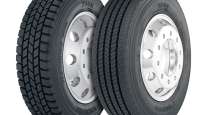Trucking Fleets Shift Tire-Buying Strategies Over Storage, Theft Concerns and Tight Supply
This story appears in the March 5 print edition of Transport Topics.
Because storage limitations, concerns about theft and supply problems have altered the way trucking companies purchase tires, carriers, manufacturers and experts said the tool of choice for economically managing this valuable commodity is a contract that allows fleets to get what they need when they need it — at a preset price.
For instance, UPS Inc., Atlanta, negotiates annual agreements with its tire makers that then are serviced by the manufacturers’ dealers.
“We sit down in the November-December time with each tire manufacturer and put a specification book on each product,” said David Zack, nonpower transportation maintenance and engineering manager for the package hauler that sits atop the Transport Topics Top 100 list of the largest for-hire carriers in the United States and Canada.
“We buy them as we need them,” he said. “We don’t see any reason to stockpile tires. We order them by truck number. If we see a truck needs tires, we get them overnight from the dealer.”
UPS has agreements with seven approved tire brands.
“While some, such as a Bridgestone steer tire, are made in Japan, I would say 99% are made in the U.S.” Zack said. “We won’t do offshore tires.”
“National account programs are how bigger fleets manage tires,” said Tom Fanning, director of sales in North and Central America for Continental Tire the Americas, Fort Mill, S.C. “It gives a balance between supply inventory and price and will come with a warranty statement. But each is negotiated according to the fleet.”
Rick Phillips, director of commercial sales for Yokohama Tire America Corp., Fullerton, Calif., said the manufacturer’s national account program allows fleets to acquire Yokohama commercial products nationwide “24/7.” He said he could not discuss any details of those contracts.
The cost of keeping a large supply of tires on hand also can get expensive.
“Today, inventories are tighter. In order to bulk buy you’ve got to be willing to buy and hold. Inventory costs go up, it gets more expensive to do it,” said Tom Brennan, vice president of retread technologies for Michelin North America Inc., Greenville, S.C.
“Most fleets look less at the purchase price than the total cost of owning and operating,” Brennan also said. “For instance, the price of the tire may be secondary, as the right tire will help drive down fuel cost.”
Darry Stuart, president of DWS Fleet Management Services, Wrentham, Mass., said stockpiling tires is a thing of the past.
“Say you buy 500 tires to get a good price, [but] it’s impossible to manage them,” said Stuart, a former chairman of American Trucking Associations’ Technology & Maintenance Council.
He said he consults with different fleets on a shared-time basis and understands the problems fleets, especially the smaller ones, face.
“There’s the cost of inventory,” Stuart said. “No fleet can afford the space. And making sure you don’t have shrinkage [from theft] is just impossible. Shrinkage could wipe out any savings you make by bulk buying. [It’s] much better to make shrinkage the tire dealers’ problem.
Negotiate a price but only take possession of the tires you’ll need daily. Most certainly, don’t keep on hand more than you need for a week.”
That point was echoed by Ken McKibben, president of consulting firm Single Source Transportation Solutions, Reading, Pa., and former head of maintenance for Penske Truck Leasing Co. Now known as Penske Logistics, also in Reading, the firm ranks No. 9 on the for-hire TT 100.
“The biggest problem with tires in inventory is that they’ll walk, and that’s a $400 to $500 stroll,” he said.
“Smaller fleets shouldn’t buy big inventories but those that do often have a different way of managing their tire inventories,” McKibben added.
“Every four to five years, we get calls from the fleets with this same question: ‘We’re considering buying a trailer load. What can you do [on discount pricing]?’ ” Continental’s Fanning said.
“Several years ago, there was a willingness to give discounts” for bulk buying, he said, “but now, if a fleet wants a trailer load, it’s hard to get.”
And although the purchase contract will provide some discount, it is usually not open to negotiation.
“Trying to negotiate a price these days is like trying to negotiate with Wal-Mart,” Stuart said. “The price is the price.”
One of the biggest issues frustrating any attempt to buy in bulk is the shortage of tires as the industry gets back on its feet.
“We’d love to be able to [buy tires by the trailer load], but the problem is supply,” said Steve Benninghof, chief operating officer of KKW Transport Inc., Pomona, Calif. “We just can’t get tires. It’s a struggle.”
The 300-truck fleet is a Yokohama client.
“We’re doing something different with Yokohama,” Benninghof said. “We’re running virgin rubber on the drives [drive tires] to generate enough casings to recap. We think the fuel economy gains from this will offset the additional cost of the extra new tires.”
“In 2011, the tire industry was sold out,” Fanning said. “I’ve talked to thousands of fleets over the years. They’re all looking for a very competitive bid.”
But even if a fleet could get a trailer load, it is a big problem, he said.
“There’s nowhere to store 250 tires, short of putting a storage trailer in the yard,” Fanning said. “And then, if a truck comes in and needs tires on a drive axle, say, that should be four tires. But if the mechanic knows there are tires in storage, the full eight are changed, and so four have been pulled way too early. What a fleet needs is sound maintenance and fixed pull points.”
Fanning offered an example of why fleets should use national account programs.
“Let’s say the prediction is that the fleet will need 200 tires for the year, then a price is negotiated . . . that gives a price break. It may save $150 per tire, but it is not dependent on the number of tires delivered at one time. If you’re buying eight tires, it’s the same price as for 30,” he said.
And that’s how rental and leasing giant Ryder Supply Chain Solutions, Miami, manages the tire requirements for the myriad truck nameplates it offers.
“We have national agreements and work with the OEM network,” said Scott Perry, vice president of supply management for Ryder, which ranks No. 12 on the for-hire TT 100.
“It doesn’t matter whether we buy one, 10 or 100 tires. That means that road repairs are covered. Vehicles are mobile, and Murphy’s Law [what can go wrong will go wrong] is always in effect.
“We do hold tire inventory on-site at each of our 800-plus maintenance locations,” Perry said. “The inventories vary according to tread and tire size and depend on local requirements, but we have to have tires on-site to facilitate repairs.
“Again, it is according to demand and also what we have scheduled out for one to two weeks, and there’s no change,” Perry said. “We’re a very service-oriented company, and that has always been our policy. That being said, we do rely heavily on Bridgestone and Bandag as our partner.”
“All fleets have different purchase patterns and buy to their needs,” said Michelin’s Brennan, who also explained why a fleet might want to buy in bulk.
One driver “of large, unusual tire purchases could be to take advantage of some financial position,” he said. “Say if the fleet has a good economic year and has cash on hand, it may be looking to hedge . . . a projected price increase or maybe for tax reasons.”
Some tire-buying strategies can depend on the job in which the fleet is engaged, Brennan said.
“A construction fleet may need to have trucks that have been idle-fitted with new tires for a four- to six-month job, so it might buy 40 tires instead of the company’s usual purchase of six to eight tires,” he said.
Brennan also said seasonal purchases are not uncommon.
“It may not be so obvious, but even the package companies do have some seasonality . . . with the increased freight volume that moves prior to the holidays and the sales that follow,” he said.
However, FedEx Freight, the over-the-highway trucking division of expedited carrier FedEx Corp., Memphis, Tenn., purchases tires through a multiyear national pricing contract, said John Smith, vice president of safety, fleet maintenance and facility services.
“We solicit bids from major tire companies based on the number of tires we estimate using during a one-year period,” he wrote in an e-mail.
“Our shop locations maintain an inventory of tires based upon the needs of their location. That inventory is replenished as necessary per the contract.”
But having a formal agreement in place does not preclude the company, which ranks No. 2 on the for-hire TT 100, from looking at new and different tires.
“We are constantly researching new tires to further improve the fuel efficiency of our fleet, including the use of SmartWay-approved tires on our equipment,” said Zack from UPS.
The tire manufacturers that did not respond to requests for comment included: Double Coin China Manufacturing Alliance, which makes Double Coin tires; Bridgestone Americas; and Toyo Tire USA.
A Goodyear Tire & Rubber Co. spokesman said the company does not like to discuss pricing.




